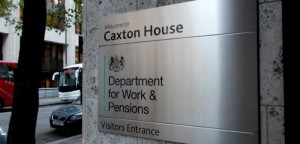
The government is refusing to release information that would reveal which ministers and civil servants decided how to respond to the death of a man who killed himself as a direct result of being found “fit for work”.
Disability News Service (DNS) revealed last month that a coroner had demanded government action after an inquest into the death of Michael O’Sullivan, from north London.
The coroner, Mary Hassell, wrote what is known as a prevention of future deaths (PFD) report, and sent it to the Department for Work and Pensions (DWP), because she said there was “a risk that future deaths will occur unless action is taken”.
O’Sullivan had severe mental health problems, including anxiety, depression and agoraphobia, and expressed suicidal thoughts in his ESA application, but medical evidence from three mental health professionals was ignored in the benefits assessment process.
It is believed to be the first and only time a coroner has used a PFD report to draw attention to flaws in the discredited work capability assessment (WCA) system, and the only time a coroner has directly blamed that system for a death.
In its response to Hassell’s report, DWP said it planned to issue a reminder to staff about guidance on such cases, but appeared to make no further suggestions for how to prevent further deaths.
After uncovering the report, DNS submitted a request under the Freedom of Information Act, asking for the name and job title of the most senior DWP civil servant to read and act on the PFD report and the action they recommended, as well as the names of ministers who were shown the report, and the action they took.
In response to the request, a civil servant in DWP’s ESA [employment and support allowance]and WCA policy division confirmed “that we hold information falling within the description specified in your request”.
But he or she said it would be too expensive to comply with the request, because it would take the equivalent of one civil servant more than three-and-a-half days to produce the necessary information.
After receiving that response, DNS asked DWP’s press office to explain why it would take so long to produce such basic information (the case has received wide publicity over the last month, and has been mentioned in parliament and across mainstream media).
A DWP spokeswoman said: “People can ask for a review of the response to their FOI.”
DNS has now asked the DWP to review its freedom of information response.
Meanwhile, two opposition MPs have raised concerns about the Michael O’Sullivan case in parliament.
Their comments came in a debate on the government’s welfare reforms, secured by the Labour MP Carolyn Harris, but which was not attended by a single Conservative backbencher.
Jim Shannon, the DUP’s shadow spokesman on health and equality, said the case had shone a spotlight on the “utter disgrace that is the work capability assessment in relation to people with mental health problems”.
He said: “Despite providing reports from three doctors, including his GP, stating that he had long-term depression and agoraphobia and was unable to work, Michael O’Sullivan was taken off [incapacity benefit]and placed on jobseeker’s allowance.
“At the inquest last year, it was found that he killed himself as a direct result of that decision.
“According to the coroner, Mary Hassell, ‘the intense anxiety which triggered his suicide was caused by his recent assessment by the Department for Work and Pensions as being fit for work and his view of the likely consequences of that’. That cannot be allowed to happen again.”
Eilidh Whiteford, the SNP’s shadow Westminster social justice and welfare group leader, said the death of Michael O’Sullivan was not an “isolated case”.
She pointed to the death of Ms DE, whose suicide in 2011 was the subject of an investigation by the Mental Welfare Commission for Scotland.
She took her own life after scoring zero points in a WCA “made in the absence of an ESA50 [application]form and without any additional information from her clinicians.
“The only information her assessor had about her condition was a single word, ‘depression’, which in her case masked a long and very complicated psychiatric history.
“Both her general practitioner and her consultant psychiatrist considered her unfit for work at the time of her death, even though she had worked for most of her adult life and wanted to go back to work.
“The distress caused by her benefits assessment may have played a role in her suicide. The investigation concluded that there was ‘no other known trigger’ for the events that took place.”
Whiteford said there were likely to be other cases like those of Ms DE and Michael O’Sullivan.
The minister for disabled people, Justin Tomlinson, did not mention the cases of Ms DE and Michael O’Sullivan in responding to the debate.
source

More Stories
Navalny’s death used to hide western failures in Ukraine and their support for Israel’s genocide
Gifts from Gaza
Vulture capital circles over the corpse of Ukraine…